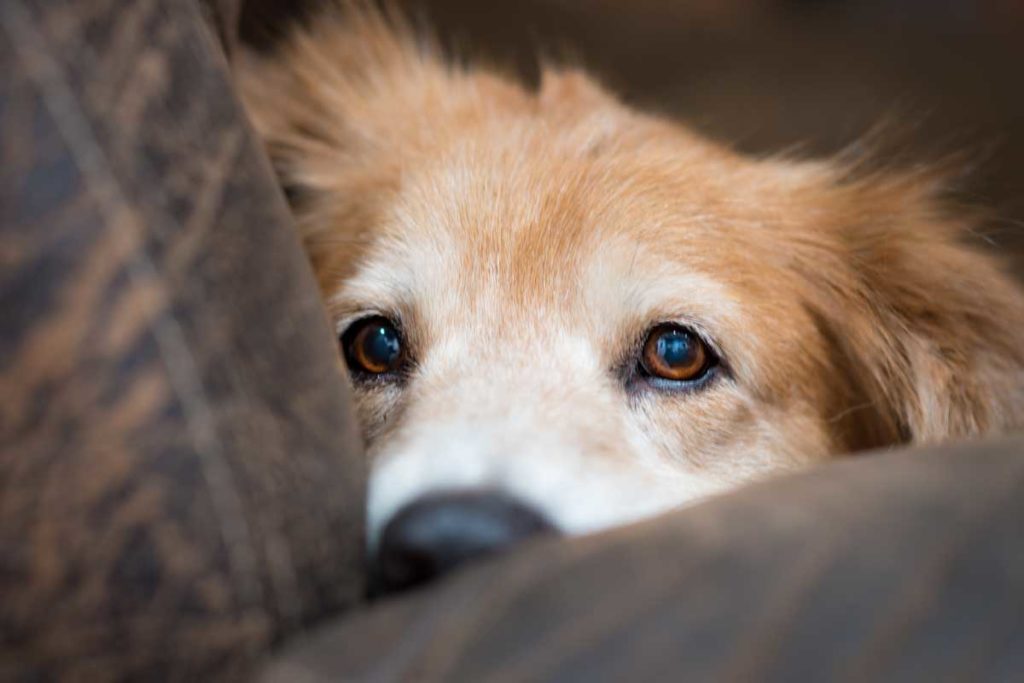Does your dog hide under the bed when an ambulance drives by or shake uncontrollably when a thunderstorm rolls overhead? Some dogs can sleep through loud noises while others spiral into a full panic.
Noise aversions and phobias are quite common. In fact, experts at VCA Animal Hospitals estimate that one in three dogs are affected by noise phobias ranging from mild to severe. These irrational, intense, and persistent fear responses can develop at any age in any dog. They can be harmful to your pup’s physical health and emotional well-being. So, what should you do about your dog’s noise phobia?
Table of contents
- Fear vs. phobia
- What causes a noise phobia?
- How can you tell if your dog has a noise phobia?
- Preventing noise phobias
- What to do when your dog has a noise phobia
- How can ElleVet’s CBD + CDA help your frightened pup?
Fear vs. phobia
There is an important distinction between fear and phobias. Fear can be a normal and adaptive response to an actual or perceived threat. An example of a fearful reaction is a dog startled by an unexpected loud noise, such as a loud knock at the door. Dr. Jerry Klein, Chief Veterinary Officer for the American Kennel Club (AKC), notes, “Fear is a defense mechanism and isn’t something we have to eliminate entirely. Wolves and other wild canids rely on fear to keep them alive.” When fearful behavior “poses dangers to the dog or other family members,” Dr. Klein warns, “we have to intervene.”
Phobias are exaggerated and excessive responses to actual or perceived threats. In dogs, these maladaptive reactions can include trembling for hours after a clap of thunder. As with people who have phobias, this fear goes beyond a rational response. Noise phobias, which are intense and persistent fears of certain sounds, can completely overwhelm dogs, physically and mentally.
The dog’s recovery period from the noise will give some indication as to if the behavior is normal or harmful. Researcher Stephanie Riemer found that nearly half of dogs in a 2019 study recovered from fireworks noise exposure within one hour. Dogs with more severe noise phobias, however, may take several hours, days, or weeks to recover. Noise aversions are also likely to worsen when left unaddressed, according to AKC. A fear of one specific sound can become generalized to fear of other sounds, whether similar or different.
What causes a noise phobia?
Noise phobias can develop from a single traumatic event or repeated exposure to a trigger. Unfortunately, it takes just one bad experience to solidify a fearful response into a phobia for some dogs. Common scary noises can be fairly obvious—fireworks, construction sounds, ambulance sirens, and thunderstorms—but they can be specific and unusual, like the sound of a skateboard rolling down the sidewalk.
It is not uncommon to find that your furry friend has developed a negative association with a particular sound. However, there may be something else going on. VCA notes that some medical conditions, particularly for senior dogs, can lead to noise sensitivity. Some research suggests that noise phobias can be inherited. According to Dr. Klein, herding breeds are particularly sensitive to sound phobias. This may be because these pups are protective and incredibly attuned to their environment.
Dogs can also develop noise phobias if they are hearing impaired. If a dog is deaf in one ear or is otherwise hearing challenged, they can have difficulty locating sounds. Not knowing where the noise is coming from can be distressing. This can also happen for older dogs, as hearing can diminish, and cognitive function may decline with age.
How can you tell if your dog has a noise phobia?

Fear is powerful. A scary sound may cause dogs to whine and cry, hide, pant, pace, tremble, and shake, urinate or defecate, or drool excessively. A fearful dog may also seek out their human family for comfort. More severe cases of noise phobia look more like panic—barking, attempting to run away, and destructive or even aggressive behavior.
VCA Animal Hospitals emphasizes that a dog’s stress response to a threat, in the short term, is healthy and necessary. In a stressful situation such as fireworks or thunderstorms, the dog is alert and ready to take action to avoid danger. However, when the response is prolonged in the case of noise phobias, your pup may suffer physical and emotional impacts.
Long-term stress can have immunosuppressive effects on your dog’s body, warns VCA. This can make your canine companion more prone to recurrent infections and altered blood flow to various organs. Panic that ensues during a phobic response can also result in your dog causing physical harm to themselves. If stuck in a crate, locked in a room, or fenced in a yard, a scared pup may hurt their paws and or mouth attempting to escape.
Preventing noise phobias
No pet parent wants their dog to develop a noise phobia. The best thing you can do, according to AKC, is to provide your pup with early socialization and positive exposure. Introduce them to potentially fear-inducing sounds and experiences. They will learn right from the start that there is nothing to be afraid of.
If your pup has already developed a noise phobia, you should avoid triggering your dog and sending them into a panic response. Avoid frightening or potentially frightening places and stay calm. Keep a regular routine and make sure their needs for nutrition, sleep, and physical and mental stimulation are met.
What to do when your dog has a noise phobia
This stress is difficult to watch and is not good for your dog. And unfortunately, noise aversions rarely resolve on their own and are likely to worsen. They can also become more generalized over time if not addressed. Helping your pup overcome a noise phobia takes patience, time, and consistency.
When you’re in the midst of a triggering event, as your dog’s pack leader, you should remain calm and confidently reassuring. You can also provide your pup with a quiet, safe space to retreat to. Offer them a comfortable crate or a cozy bed in the corner of the living room. Research has found that classical music played softly can be calming. Additionally, a calm demeanor from humans helps to show that there is nothing to fear.
Most phobias are predictable, which means you can consider them a training opportunity. Behavior modification techniques such as desensitization, positive reinforcement, counterconditioning, and redirection can be helpful in teaching your pup to overcome their fear. Pet parents can try conditioning their dogs with gradual exposure to sounds in a controlled, relaxed environment.
If you see the early signs of noise aversion, it is in your dog’s best interest to immediately seek advice from a veterinary professional and or animal behaviorist. Often a behaviorist will come to the house and teach you and your dog how to manage stressful situations.
…and what not to do
AKC notes that owners often contribute unintentionally to their dog’s phobias by either reinforcing undesirable behaviors or even instigating them. “One of the things I see people do all the time is say things like ‘good boy’ during stressful situations. This can reinforce fearful behavior, as the owner is rewarding the dog for acting fearful,” says Dr. Klein. He notes that some dogs even learn to anticipate a stressful situation when they hear words like “it’s okay.” Excessive coddling can increase codependence and reinforce phobias.
How can ElleVet’s CBD + CDA help your frightened pup?

ElleVet’s Calm & Comfort situational use chews provide maximum support for dogs, allowing them to calmly address noises that set off stress-related responses. These chews, when given 1.5 hours ahead of the trigger event or noise, are extremely effective. Addressing your dog’s acute level of stress, by truly calming without sedating, ElleVet’s CBD + CBDA can lead to a reduction of the fear response over time. They may never enjoy a thunderstorm or fireworks. But if they can manage their stress and respond calmly, then you both will be much happier. And we all want a happy and relaxed pup!
Any health or medical information in ElleVet blogs is from a variety of public and reputable sources. This information is intended as an educational resource only and is not a substitute for expert professional care.









